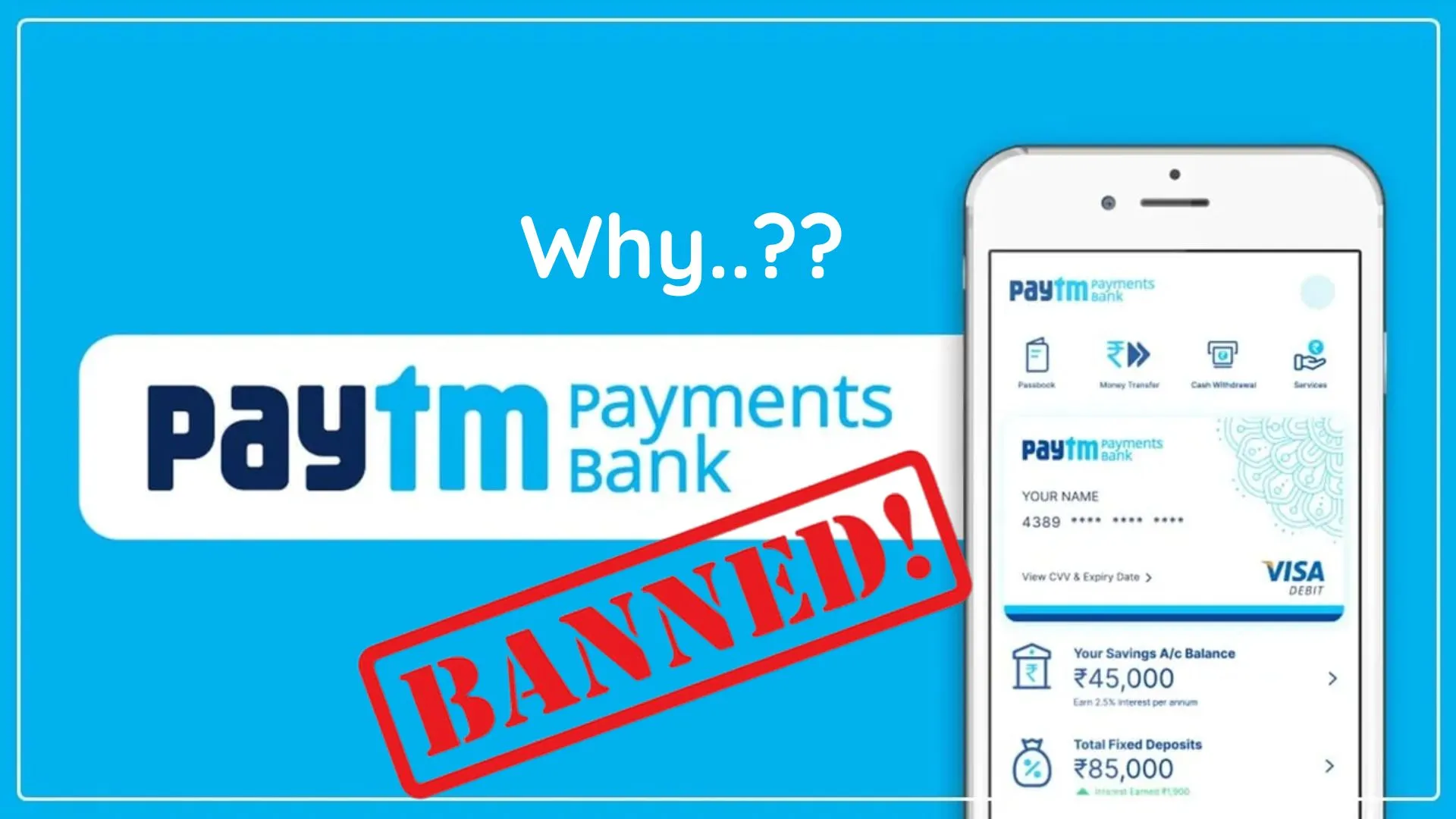After Byju’s, Is Paytm The Next Company To Get Extinct From The Market?
The Indian business sector has recently witnessed the downfall of prominent company - Byju's, raising concerns about the sustainability of other market giants. Amidst this backdrop, Paytm, once hailed as a fintech unicorn, finds itself in the eye of the storm. Recent developments, including regulatory interventions and market debacles, have cast doubts on Paytm's future. From RBI's ban on Paytm Payments Bank to SEBI's unsuccessful scrutiny over its IPO valuation, Paytm's journey from a market darling to a caution warrants a closer examination, not to forget the many red flags that should have been hoisted long ago; now the result is that investors bleed yet again - on the Paytm Fiasco once again!

After Byju’s, yet another unicorn falls to dust!
Just recently, the Indian government took action to suspend operations of Paytm’s payments bank, exclusively dedicated to processing transactions and not involved in loan issuance, from accepting new customers.
Sources suggest that concerns over money laundering and significant transactions between Paytm wallet and its lesser-known banking arm prompted the RBI to tighten regulations on entities associated with Vijay Shekhar Sharma, the tech poster boy.
The reason cited was alleged data sharing by Paytm with Chinese servers, reinforcing existing concerns about the increasing regulatory scrutiny on Indian fintech companies with ties to China.
Despite Paytm’s denial of these allegations, an audit is currently underway, leading to a renewed decline in its share price.

The Suspension
In response to reported violations, Paytm now faces the potential loss of its Payments Bank license.
Concerns over money laundering and breaches of Know Your Customer (KYC) regulations have prompted the Reserve Bank of India (RBI) to notify the Directorate of Enforcement (ED).
These infractions, identified by the banking regulator over recent years, have subjected the fintech provider to heightened scrutiny.
The Home Ministry has also raised concerns with the Prime Minister’s Office regarding security risks associated with financial transactions linked to entities connected to China.
Following this development, Paytm’s shares have witnessed a significant decline of 43% since January 31, trading near an all-time low of Rs 438.35 per share.
The downward trend began after the RBI prohibited Paytm Payments Bank Ltd (PPBL) from accepting further deposits starting February 29, due to persistent non-compliance issues.
The directive meant that PPBL would be unable to carry out any banking activities, including accepting deposits, credit transactions, wallet top-ups (including FASTags), and bill payments.
Subsequently, a report on February 2 suggested that the RBI is contemplating the cancellation of Paytm Payments Bank’s operating license as early as next month, once depositor interests are safeguarded.
The report noted that a definitive decision has not yet been made, and the RBI’s stance may evolve based on Paytm’s representation.

What constitutes Paytm Payments Bank?
Paytm Payments Bank Ltd (PPBL) operates as an affiliate of One97 Communications Limited (OCL).
Vijay Shekhar Sharma and One97 Communications jointly hold the majority of shares in the company, with a 51% stake owned by Vijay Shekhar Sharma and the remaining 49% held by One97 Communications.
PPBL commenced its operations on May 23, 2017, offering a range of digital banking services, including savings accounts, current accounts, fixed deposits with partner banks, as well as features such as wallets, UPI, and FASTag.
As per regulations governing payment banks, they are restricted from engaging in lending activities and can only accept deposits up to Rs 2,00,000. Additionally, Paytm Wallet falls under the purview of PPBL.
According to RBI’s provisional data for December 2023, Paytm Wallet users conducted 247.2 million transactions, amounting to over Rs 8,000 crore for goods and services purchases, with an additional 20.7 million transactions worth over Rs 5,900 crore for fund transfers.

Now the real question is since how long has Paytm Payments Bank been under regulatory scrutiny?
The RBI, it seems, has been closely monitoring PPBL for a significant period.
In 2018, the RBI temporarily halted the opening of new accounts in PPBL due to violations of licensing conditions and non-compliance with Know-Your-Customer (KYC) norms.
Subsequently, in 2021, the RBI discovered that PPBL had provided false information and imposed a fine of Rs 1 crore.
On March 11, 2022, the RBI prohibited PPBL from onboarding new customers immediately and directed the bank to appoint an IT audit firm to conduct a comprehensive system audit.
By October 2023, PPBL faced a penalty of Rs 5.39 crore for continued non-compliance with KYC norms.
However, Paytm has clarified that there are no ongoing investigations for foreign exchange violations against the company.
A recent report, however, highlighted that PPBL had numerous non-KYC-compliant accounts, with instances of single PANs being used to open multiple accounts.

The Warning From CAIT
In response to the RBI’s restrictions on Paytm wallet and bank operations, the Confederation of All India Traders (CAIT) issued a cautionary advisory on February 4, advising traders to transition from using Paytm to alternative payment methods for conducting business transactions.
CAIT stressed the importance of proactive measures to safeguard funds and ensure uninterrupted financial transactions in light of the RBI’s recent actions.
Given that a significant number of small traders, vendors, hawkers, and women rely on Paytm for payments, CAIT expressed concerns that the RBI’s restrictions on Paytm could disrupt financial services for these individuals.
CAIT Secretary General Praveen Khandelwal highlighted the need for immediate action, stressing the importance of traders making informed decisions to mitigate any potential disruptions to their financial operations.
The ED Slap
Revenue Secretary Sanjay Malhotra announced in February 2024 that the Enforcement Directorate (ED) would initiate an investigation into Paytm Payments Bank if any evidence of illicit activities, particularly money laundering, was uncovered.
Malhotra emphasized that the ED would scrutinize the bank if new allegations of fund diversion surfaced.
However, Paytm has refuted any assertions of an ongoing ED investigation involving the company, its affiliates, or its founder and CEO concerning money laundering.

How SEBI Granted Approval for Paytm’s IPO Despite Excessive Market Valuation
Now the hand comes to SEBI.
Backed by support from prominent investors and being fervently endorsed by its outspoken CEO, Paytm’s initial public offering (IPO) was anticipated to soar upon its debut.
However, reality struck hard.
Paytm’s IPO suffered a substantial setback, marking the worst performance in Indian IPO history.
Initially listed at Rs 2,150, its stock price plummeted by 30% by day’s end, eventually plunging to a dismal Rs 522, a staggering 75% decline from its opening price.
Overnight, what was perceived as a guaranteed success story transformed into an impending disaster.
Questions abound regarding the circumstances surrounding this dramatic turn of events, with concerns arising about how to avert similar occurrences, but have we?
Goldman’s sentiment appears fitting when examining the Paytm IPO, which debuted $2.5 billion worth of shares at approximately Rs 2,150, valuing the company at $20 billion.
Despite the majority of analysts adopting a positive outlook on the IPO, extolling the remarkable growth potential in digital payments, their assessments ultimately proved to be superficial speculation.
However, amidst the prevailing optimism, two analysts from investment firm Macquarie stood out by offering a critical evaluation.
In their report titled “Too Many Fingers in Too Many Pies,” Suresh Ganapathy and Param Subramanian dared to challenge the prevailing storyline, pointing out significant flaws in the company’s strategy.
As investors, it’s prudent to pose fundamental questions about a company’s viability before committing capital.
Questions regarding profitability, profit margins, competitive advantages, market leadership, revenue growth rates, competitor performance, industry focus, diversification strategies, and potential disruptions are essential considerations.

Employing such critical inquiry, the Macquarie analysts meticulously dissected Paytm’s business model, revealing glaring shortcomings and providing insightful answers to these fundamental questions.
It appears evident that Paytm’s digital wallet business was facing a clear decline, primarily due to the emergence of the Indian UPI payments system stack, a government-developed platform that gained prominence in recent years.
With a vast network of banks facilitating seamless money transfers between individuals and institutions, the UPI system posed a formidable challenge to digital wallets like Paytm’s.
Adding to Paytm’s woes was the fact that the UPI system was free of cost, rendering digital wallets economically unsustainable.
This double blow significantly undermined Paytm’s position in the market.
Although Paytm attempted to diversify its business early on by venturing into various sectors such as consumer lending, credit cards, wealth management, insurance distribution, movie ticketing, fantasy sports, and e-commerce, it failed to establish a leading position in any of these ventures.
Macquarie aptly described Paytm as “a cash-burning machine” with no clear path to profitability across its diverse business lines.

The Glaring Red Flags!
One potential avenue where Paytm could have capitalized on was banking services.
However, the company’s association with major Chinese investor Alibaba raised significant concerns, particularly in light of India’s security issues with its neighboring country, making the acquisition of a banking license highly improbable.
Despite these glaring red flags, over 100 institutional investors, including prominent entities like the government of Singapore, BlackRock Global Funds, the Canada Pension Plan Investment Board, and the Abu Dhabi Investment Authority, eagerly subscribed to over 45% of the $2.5 billion IPO offering as anchor investors.
However, they now find themselves in a precarious position; it can be misleading, particularly if based on a pre-IPO valuation set by stakeholders who may be influenced by biases and a desire for significant financial gains.
Even by these metrics, Paytm raised red flags, boasting a price-to-sales ratio of 26 for 2023, significantly higher than the 0.3-0.5 range typical for global financial companies, as reported by Macquarie.
Remarkably, Paytm experienced a decline in sales in 2021, a fact that seemed to escape the notice of many investors.

Where SEBI Failed
Paytm, its founder and investors succeeded in inflating the company’s value to $16 billion in 2019, and then to a pre-IPO valuation of $19 billion, falling short of their ambitious targets by a few billion dollars.
Paytm’s IPO was oversubscribed by a 1.9 times.
Interestingly, the majority of oversubscription did not come from retail investors but from seasoned foreign institutional anchor investors like BlackRock, the Canada Pension Plan Investment Board, and the Abu Dhabi Investment Authority, who oversubscribed by 10 times.
Once again, it seems that even esteemed global financial institutions were unable to discern the impending pitfalls.
Paytm’s CEO, Vijay Sharma, seemed enamored with the notion of “go big or go home,” aiming for India’s largest IPO, surpassing Coal India’s record in 2010.
In analyzing Paytm’s IPO debacle, it becomes evident that the Securities and Exchange Board of India (SEBI) played a significant role, and its oversight failures contributed to the erosion of retail wealth on an unprecedented scale in Indian markets.
Why was it not able to read the ‘warnings on the wall’ and allowed Paytm to come out with its IPO that failed miserably?
For now that the case has been turned over to ED, it must probe Paytm, Paytm Payment Bank and other businesses diligently.




